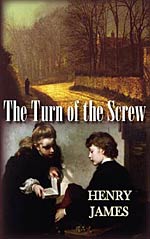
![]() Scott Laz
Scott Laz
1/14/2012
![]()
The Turn of the Screw is a masterpiece of ambiguity. It may be a ghost story about two small children victimized by the ghosts of the family servants who corrupted them while they were alive, and of the efforts of their governess to save them from the darkness. Given the evidence of the story, it is also entirely possible that the children are completely innocent, and that their governess, the story's narrator, is dragging them down with her into hallucination and madness. Nor do these polar interpretations exhaust the possibilities.
Henry James is one of the great masters of the English language, and is best known for his novelistic explorations of the psychology of his characters. His approach is indirect, and the reader's challenge and pleasure arises through the attempt to determine the real motivations and emotions of the characters--motivations and emotions that the characters themselves may not entirely be aware of. James presents a gradual accretion of conversation, thoughts, and actions that slowly provide us with the possibility of understanding the lives of his characters. Much remains unsaid by the characters in James's stories, but their inner life is slowly revealed in this fascinating way. What is possibly less known about James is that several of his shorter works (The Turn of the Screw is really a novella) are ghost stories, though these, along with his better known realistic works, are ultimately psychological explorations, with the ghosts representing (or possibly arising from) the psychologies of those who perceive them.
In The Turn of the Screw, the ghosts are the lingering presences of two former employees of a wealthy estate, whose owner had left them to raise his niece and nephew, Flora and Miles, upon the death of their parents. The former governess, Miss Jessel, and Peter Quint, had had an affair, and both died under circumstances that are not made explicit. Also left unsaid is the specific influence of them and their affair on the children. The reader learns that the housekeeper, Mrs. Grose, thinks that the children knew of the affair, and that the lovers spent a lot of time alone with Miles and Flora. The new governess (who is never named) enters this scene after the deaths and, upon encountering the ghost of Quint (and eventually Jessel as well) becomes convinced that they have returned to continue their "unnatural" relationship with the children. The possibility of sexual abuse inevitably arises in the reader's mind (why else would the governess have such an extreme response?), but there is no actual evidence of it.
Since the reader cannot tell for certain what happened before the new governess arrives, it is impossible to say for certain what is really going on here. There is evidence allowing for multiple interpretations. No one but the governess admits to seeing the ghosts, though she is convinced that the children are hiding their awareness of them, and there are hints in the children's actions and statements (as reported by the governess) that they are sneaking off the meet the ghosts of their corruptors. The main bit of evidence that the ghosts are real is that the governess's descriptions of them to Mrs. Grose matches those of the recently deceased Quint and Jessel, even though she would seemingly have had no way of knowing what they looked like, or even being aware of their existence. On the other hand, the governess jumps from the smallest hints, or even intuitions, to quite dire conclusions as to what may have happened to the children, becoming increasingly obsessed with the idea of their corruption. In that context, the children's behavior can be construed as a reaction to the increasingly bizarre and confrontational behavior of their new governess.
The reader may be tempted to see the story as a puzzle, sifting through the evidence to find the "real" interpretation of events, but this is ultimately impossible, if only because the story is told through the first person narration of the governess, the only witness to the ghosts, and the only source of the reader's knowledge of these events. Her reliability as a narrator is unknowable, and certainly questionable given the extreme nature of her reaction to her suspicions about the children. She vacillates between the idea that the children's innocence can be saved, and a conviction that they are permanently lost. "I seemed to float not into clearness, but into a darker obscure, and within a minute there had come to me out of my very pity the appalling alarm of [Miles] being perhaps innocent. It was for the instant confounding and bottomless, for if he were innocent, what then on Earth was I?" And, it could be added, if Miles and Flora are not innocent, what precisely are they guilty of? And what is the real evil influence on Miles and Flora? The previous actions and continuing attraction of the dead Quint and Jessel? Or the behavior of their new governess, who seems to be more obsessed with accusing them than helping them? We'll never know.